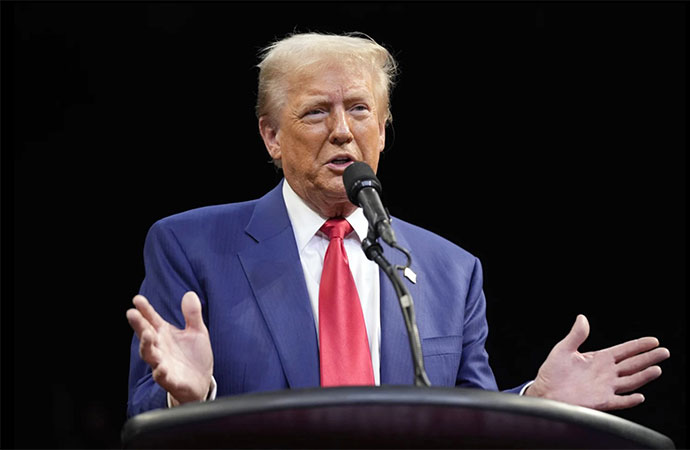Global

Republican presidential nominee former President Donald Trump. Photo: AP/ UNB
In a rapidly changing global landscape marked by geopolitical, economic, and political turbulence, forecasting is a perilous endeavor. But as Donald Trump prepares to return to the White House in 2025, one thing can be said with certainty: it will be a bumpy ride.
Every December, Project Syndicate commentators identify the most important political, economic, and policy trends to watch in the year ahead. At the start of 2024, PS contributors predicted a tumultuous and pivotal year for global democracy, shaped by elections, escalating conflicts, and the emergence of potentially disruptive technologies. As we head into 2025, PS contributors foresee a make-or-break year for multilateralism and progress on climate change, with US President-elect Donald Trump's second term casting a long shadow over global stability.
Rabah Arezki
With Donald Trump's re-election as US President, "economic sovereignty" is poised to consolidate its place in the political mainstream. Broadly defined as a country's capacity to make independent economic decisions, this concept has gained traction in recent years amid a global backlash against free and open markets - often accompanied by the scapegoating of migrants and minorities. I predict that as the backlash intensifies, the shift toward economic sovereignty will accelerate, with profound implications for international trade, capital flows, 1 and migration patterns.
Shlomo Ben-Ami
The world's two most consequential crises - the war in Ukraine and the Israel-Palestine conflict - are likely to persist well into 2025. While Israel and Hezbollah have reached a fragile ceasefire in southern Lebanon, the Palestinian issue is far more difficult to resolve. But Israel's military exploits present Trump with the gift of a transformed Middle East in which Iran's entire axis, including its Syrian base, has fallen apart. Still, Israeli Prime Minister Binyamin Netanyahu's far-right coalition remains an obstacle to any long-term solution for Palestine. In his first year in office, Trump may focus on normalizing Israel-Saudi Arabia relations and averting an all-out war between Israel and Iran. There is an obvious risk that a weakened Iran would gallop toward the nuclear bomb.
Meanwhile, Europe's war fatigue and the shifting geopolitical landscape following Trump's re-election could pave the way for a settlement in Ukraine. Such an agreement could involve recognizing Russia's territorial gains in return for Ukraine's accession to the European Union and security guarantees by NATO. In Asia, Chinese President Xi Jinping is unlikely to invade Taiwan before gauging Trump's willingness to reset US-China relations. Given China's current domestic challenges, Xi may have to put his broader expansionist ambitions on hold.
Laura Carvalho
America's anticipated withdrawal from climate negotiations, coupled with the resurgence of protectionism across the West, will fuel mistrust of multilateralism and its capacity to address sustainability and development challenges. As Brazil prepares to host next year's United Nations Climate Change Conference (COP30), South Africa will become the first African country to host the G20 summit, signaling a shift toward a new era of economic cooperation led by the Global South. By expanding access to technology and integrating into global supply chains, developing-country governments could seize on the economic opportunities presented by the climate transition and promote a multilateral trading system that transcends zero-sum dynamics.
Fawaz A. Gerges
Israel and Hamas might sign a ceasefire deal soon, but Israel's war against Hamas will continue into 2025 and may escalate into a direct confrontation with Iran. For Netanyahu, the Islamic Republic remains the ultimate target, and he will intensify his efforts to drag the US back into the Middle East's cycle of violence. Trump's anti-war instincts may be the only thing standing in the way of his hawkish foreign-policy and national-security advisers, who could prevail on him to attack Iran's nuclear program.
Antara Haldar
The global order that emerged after the end of World War II, built on the twin pillars of liberal democracy and neoclassical economics, promised to deliver peace and shared prosperity. But nearly 80 years later, this system appears to be on the verge of collapse. Trump's incoming administration could undermine many of the multilateral order's core purposes, such as upholding free trade and facilitating collective action against shared threats, like climate change (ironically on the ten-year anniversary of the Paris agreement).
Trump's second term is almost certain to create a global leadership vacuum, fueling geopolitical disarray. Amid the fading of the Washington Consensus and a pivot from the positivistic postwar regime in both developed and developing economies, the question is whether the international community can reform its economic and political institutions to serve ordinary people and address the widespread discontent fueling the rise of populism globally.
James Livingston
Trump's second presidency could quickly become a rolling constitutional crisis, beginning with an end-run around Article II, Section 2 of the US Constitution, which establishes the Senate's "advice and consent" process for approving presidential appointments. Trump may try to bypass the Senate to install incompetent culture warriors in key cabinet positions, including Pete Hegseth as Defense Secretary and Kash Patel as FBI Director. This would require Trump to eliminate the Senate filibuster or rely on the Supreme Court to expand presidential authority by reinterpreting the constitutional distinction between principal and inferior officers. The result will be political and institutional chaos.
Carlos Lopes
In 2025, advances in artificial intelligence - powered by generative AI and the integration of large language models into fields like quantum computing and synthetic biology - will usher in entirely new modes of value creation. These technologies will move beyond traditional intellectual property frameworks, enabling unprecedented levels of collaborative innovation and problem-solving. For African countries, such breakthroughs create an opportunity to develop tailored solutions for education, health care, and sustainability, overcoming conventional barriers to institutional and economic reform. The resulting transformation will boost creativity, redefine ownership, and revolutionize the global exchange of knowledge.
Roberto Patino
Migration will dominate the global agenda in 2025 as rich economies struggle to reconcile their reliance on foreign workers with a growing backlash against immigration. At the same time, climate disasters, wars, and political instability will fuel displacement worldwide. US labor shortages will clash with the incoming Trump administration's restrictive immigration policies, while European leaders fear that renewed conflicts in the Middle East could trigger fresh migration waves.
Venezuela remains a potential flashpoint as well. If President Nicolas Maduro is removed from power, millions of emigrants may finally return home, offering a glimmer of hope in an otherwise grim landscape. But if Maduro violently clings to power, the global migration crisis - to which millions of desperate Venezuelans have contributed - will intensify.
Stephen S. Roach
Trump's infatuation with Elon Musk underscores his proclivity for late-in- life bromances. Xi, whom Trump reportedly invited to his inauguration, could be his next diplomatic focus, leading him to tone down his tariff threats against China and join a renewed effort to pressure Russia. But a cornered Vladimir Putin could destabilize Eastern Europe, with potentially severe consequences for Western Europe's already fragile economy. This scenario poses grave risks to the tenuous optimism underpinning consensus forecasts of a soft landing for the global economy.
Vera Songwe
Central banks face a demanding year in 2025 as they work to manage inflation and steer economies toward a sustainable growth path. After years of currency depreciations and social unrest, avoiding a recession remains a top global priority. Developing countries, especially in Africa, will be watching closely, hoping that the worst is behind them.
The cryptocurrency boom introduces a new dimension to asset valuations as major asset managers enter the market. African countries are also increasingly active in the crypto domain. Will 2025 mark the beginning of a globally coordinated effort to regulate these markets? As policymakers and regulators navigate this evolving landscape, they must also focus on developing forward-looking climate- risk models, balancing immediate economic challenges with long-term sustainability goals.
Paola Subacchi
This will be a make-or-break year for multilateralism. As G20 president, South Africa faces the daunting challenge of sustaining dialogue amid escalating tensions between the US and China, as well as between the Global South more broadly and developed economies. Delivering on an ambitious agenda while preparing for the US to assume leadership in 2026 will be crucial to maintaining the group's credibility as a platform for international cooperation.
Another critical event is the UN Fourth International Conference on Financing for Development, which must overcome entrenched divisions and mobilize financial resources to meet longstanding climate-finance commitments. Meanwhile, the International Monetary Fund and the World Bank must rethink their proposed reforms in the face of indifference or outright opposition from the US, their largest shareholder. With the multilateral order increasingly strained by economic fragmentation and political polarization, these efforts will shape the trajectory of global cooperation for years to come.
Isabella M. Weber
In many ways, 2025 will be a watershed year for the resurgence of the far right. Trump's administration will embolden extreme-right parties around the world, while his "trade war 2.0" threatens to trigger a global deglobalization shock. Devising an anti-fascist economic- policy strategy that can win back voters and present a real alternative to nationalism, xenophobia, and climate- change skepticism will be an urgent task for all democrats.
Woochong Um
In 2025, developed economies will face growing pressure to fulfill their climate-finance commitments under the 2015 Paris agreement, even as new trade restrictions and tariffs affect the affordability and availability of renewable-energy technologies. While many were disappointed by the outcome of COP29 in Baku, the pledge to provide developing countries with $300 billion in annual climate financing by 2035 represents an important step forward, highlighting the need to promote a just green transition and eradicate energy poverty.
The world's most pressing challenge will be financing renewable energy where it is needed most: in climate- vulnerable countries and communities across Africa, Asia, Latin America, and the Caribbean. This will require coordinated investments from governments, the private sector, and multilateral development banks. Beyond creating new economic opportunities for emerging economies, such a concerted effort would ensure that all countries can protect themselves against the devastating effects of climate change.
Angela Huyuezhang
As Trump prepares to return to the White House in January, he is set to dominate headlines once again. If his previous administration is any guide, he will embrace reckless, even harebrained ideas, retreating only when markets push back. But this time, the stakes are even higher. With fewer institutional checks and stronger backing from Congress and the Supreme Court, Trump will wield more power than ever.
This raises an unsettling question: Does Trump fear anything beyond market reactions? In any case, his unpredictability and disregard for established norms signal economic turbulence ahead. If his first term was chaotic, his second promises to be more - much more - of the same.
From Project Syndicate

























Leave a Comment
Recent Posts
Auspicious beginnings, but a l ...
The newly elected government of Bangladesh is now in office, and the e ...
Caught between tigers and pira ...
Over 10,000 fishermen in the Sundarbans have suspended their fishing a ...
Historic Chawk Bazar comes alive with iftar items on ..
Shaping Young Conservationists: School Conservation ..
Iran has said it has reached an understanding with t ..
New Finance Minister Amir Khosru Mahmud Chowdhury